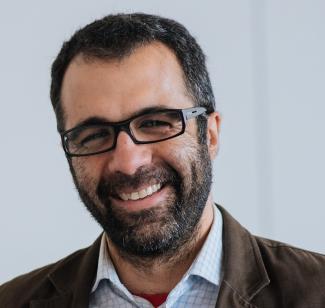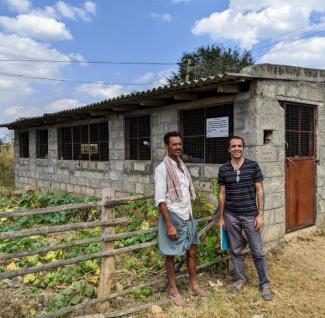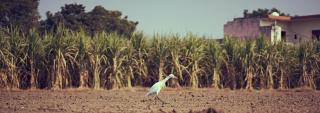by Nathan Ruff
The MFRE Faculty Spotlight series highlights the work of faculty members at the UBC MFRE masters degree. This is a group of accomplished professors specializing in topics in the Food and Resource Economics sector such as food security, environmental economics, sustainable development, public policy, agricultural commodities, and natural resources management. This time we shine the spotlight on Dr. Sumeet Gulati and his recent sabbatical, during which he gained an intimate perspective concerning the landscapes and communities at the heart of his research.
As part of his sabbatical last year, MFRE Professor Dr. Sumeet Gulati spent time abroad in order to better understand the realities faced by his research subjects, specifically farm managers in India who experience conflict with wildlife. In the process of further contextualizing his research, Dr. Gulati learned that inadequate measures to prevent damage from wildlife can be better explained by the role of poverty than the role of moral hazard arising from poorly designed programs.
To explore more on the topic of human-wildlife conflict and on his sabbatical, Dr. Gulati answered the following questions for us:
1. How would you explain what it means for a professor to be on sabbatical to someone who has never heard the term before?
The sabbatical is also termed a research leave. Most research faculty positions are delineated into a time commitment of 40% teaching, 40% research, and 20% administrative work. During the sabbatical, faculty members are relieved of their teaching and administrative duties, and are expected to spend their entire time advancing their research agenda.
2. How did this sabbatical compare to previous experiences?
This was my second sabbatical since I started my academic career at UBC and teaching at the MFRE masters degree. While my previous sabbatical was spent entirely in Vancouver. During this sabbatical, I also travelled to India to visit another academic institution, the Indian School of Business, and spend time in villages interviewing those experiencing conflict with wildlife. This opportunity enriched my research experience substantially.

3. What were your main priorities heading into your sabbatical?
Two years before my sabbatical I started investigating issues of human-wildlife conflict. One year before the sabbatical, in partnership with an NGO in India, the Centre of Wildlife Studies, I started a survey of villagers in Karnataka on their experience with wild animal conflict. I felt a need to get to know the landscape and people behind the data I was studying. One important aim for my sabbatical was to spend time in the villages we were surveying.
4. Has your research focus changed since going on sabbatical? If so, what motivated this change?
Before going on my sabbatical, I was interested in estimating the perverse incentives that emerge from offering compensation for damage from wildlife to farmers living on the edge of forests. Many governments and NGOs are concerned that offering compensation ex-post discourages farmers from protecting their personal property the best they can.
On spending time with the farmers, I realized the insignificance of this question. I discovered the (fairly obvious) role of poverty on the ability of farmers to protect themselves from losses inflicted by wildlife (these losses include crop, livestock, personal injury, and death). Poor farmers do not have the resources to build electric fences to keep animals out of their fields, invest in sturdy sheds to protect their livestock, or nimbly alter cropping patterns in response to animal raids. Poverty also hinders their ability to recover from such losses. Living on the edge of subsistence implies that an elephant crop raid can be devastating to their income and food security.
Since my visit, my research questions focus on the inequity of the impact of wildlife conflict.
5. Beyond environmental economics or public policy, what new issues and research questions are you most looking forward to addressing post-sabbatical?
I am collecting information on human casualties (fatalities and injuries) from wildlife conflict in India. I hope to understand spatial and behavioural patterns underlying conflict that leads to human casualties. I am particularly interested in detecting patterns that inform the impact of wealth and class in experiencing injury or death from conflict with wildlife, and the ability to recover from such experiences.
6. What was the highlight of your sabbatical from a non-academic perspective?
I spent my time in India in Hyderabad and Karnataka, and although dosas and idlis are not originally from that part of India, they are very popular in the region. I was fortunate to be able to eat them frequently while I was there.
On my return, I discovered a store in Vancouver that sells home-made dosa and idli batter and have since been making my own. This has certainly been a highlight.

Read Dr. Gulati’s fieldnotes to learn more about human-wildlife conflict and his experience in India.
About Dr. Sumeet Gulati
Sumeet Gulati is a professor at The University of British Columbia in the Faculty of Land and Food Systems and the Master of Food and Resource Economics (MFRE) program. His research interests include the economics of wildlife conservation, the economics of urban transportation, and the effectiveness of environmental policy. Sumeet teaches Environmental Economics and Policy in the MFRE masters program. He holds an undergraduate economics degree, as well as a master's in economics, a master's in agricultural and resource economics, and a PhD in agricultural economics.
